Brent Hartinger's Blog, page 8
February 17, 2015
Is Fan Fiction a Good Thing?
 In my latest Media Carnivores podcast, Erik and I take on the question of whether or not fan fiction is a good or bad thing for the world!
In my latest Media Carnivores podcast, Erik and I take on the question of whether or not fan fiction is a good or bad thing for the world!
 Send to Kindle
Send to KindleJanuary 29, 2015
How Do Writers Deal with Failure?
 Our latest Media Carnivores podcast, How Do Writers Deal with Failure? Erik and I share embarrassing details about our own failures, but also offer advice on how to pick yourself up, dust yourself off, and carry on. (Bonus: hear the story behind The Order of the Poison Oak!).
Our latest Media Carnivores podcast, How Do Writers Deal with Failure? Erik and I share embarrassing details about our own failures, but also offer advice on how to pick yourself up, dust yourself off, and carry on. (Bonus: hear the story behind The Order of the Poison Oak!).
 Send to Kindle
Send to KindleJanuary 22, 2015
THE THING I DIDN’T KNOW I DIDN’T KNOW: The Music Video!
Here it is! It’s a music video for a song based on my latest book The Thing I Didn’t Know I Didn’t Know (Russel Middlebrook at age 23).
It’s basically the story of Russel and Felicks’ first date (chapter eight in the book). Check it out:
How in the world did this music video come about?
Last summer my partner Michael Jensen and I were brainstorming ideas to promote the upcoming release of my new book, The Thing I Didn’t Know I Didn’t Know. I’m not a big fan of book trailers (most look amateurish to me, and nobody watches them anyway).
So Michael suggested, “Why not do a music video? Maybe it’ll go viral.”
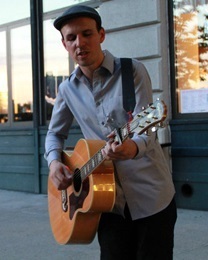
Brett Every
I loved this idea! I didn’t know of any author doing anything like this ever before, so I figured it’d be a good marketing gimmick. But more than that, I loved the idea of being able to do something for the fans of my books and this character — to give them something fresh and different that they might hopefully enjoy (for free!).
I pitched the idea to my musician friend Brett Every. He’s Australian, but he currently lives in New York, and I’ve long been a big, big fan. The agreement was that he write and produce the song, and I would write and produce the video. Hopefully, it would serve both our fanbases.
He loved the idea too. So he read the book and soon wrote a terrific song based on the book and the character of Russel. I think he perfectly captures Russel: his hope and fear, his neurotic tendencies, his intelligence, and ultimately his wary optimism.
Once I had the song, I realized: I told Brett I’d produce a music video. I’d never done anything like that before! What had I gotten myself into? I started to panic.
Who made the video?
Realizing I’d made a commitment to Brett (and he’d delivered his end of the bargain!), I started asking everyone I know: “Do you know any local filmmakers?” I didn’t have much of a budget, but I started compiling a list of names. I talked to a lot of people, and finally decided to go with an up-and-coming filmmaker named Jeremy Ward (also an extremely nice guy).
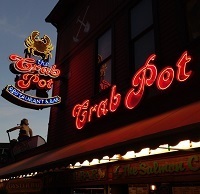 I had a pretty clear idea for the video — that it would tell the story of Russel’s date with Felicks (the events of chapter eight in the book). In the book, they go to the Crab Pot Restaurant, and I had a feeling a dinner there would make a great visual for the video. More and more, I was thinking of the project as less of a “music video” and more of a “short film,” telling the sweet, romantic story of these two guys on a date.
I had a pretty clear idea for the video — that it would tell the story of Russel’s date with Felicks (the events of chapter eight in the book). In the book, they go to the Crab Pot Restaurant, and I had a feeling a dinner there would make a great visual for the video. More and more, I was thinking of the project as less of a “music video” and more of a “short film,” telling the sweet, romantic story of these two guys on a date.
Together, Jeremy and I hashed out the rest of the video, and I wrote up an actual script.
(And for the record? Just because there’s no dialogue, everything still needed to be written out. The actors had to know what to do, and the crew needed to know what to film, right?)
How did you get the Crab Pot to go along with it?
I called them up! I explained my idea for the video, and they liked it too. In fact, the owners of the Crab Pot also own the Seattle Great Wheel ferris wheel and the Pier 57 merry-go-round, and they suggested I use those locations too. (I’d been planning on using those locations anyway, but I hadn’t expected it to be so easy.)
So now I had a director, a script, and a location. Meanwhile, Jeremy was assembling his film crew (which included the great Seattle cinematographer Tylor Jones).
Wait. Didn’t I need actors or something?
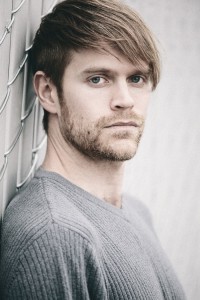
Hans Iverson, AKA “Russel”
Who are those great actors?
When I was telling my friends about this project, everyone in the theater said the same thing: “You’re paying your actors? You won’t have any problem at all getting people!”
Sure enough, when we put out the casting notices, we did get a lot of headshots and resumes.
But almost everyone was wrong for one reason or another. If they looked right, then they weren’t available on the right days
Then Seattle actor/model Hans Iverson walked into the audition room. Right away, I thought, “He could be Russel at age twenty-three!”
Then he started auditioning, and I realized, “And he can act!”
We offered him the part right then and there.
In the book, Felicks is Indian-American. Why isn’t he in the video?
I really, really, really tried. Part of the reason why I include non-white characters in my books is because I believe in the “cause” of diversity (but mostly because it’s simply more realistic and interesting).
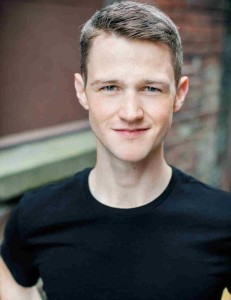
Randall Brammer, AKA “Felicks”
But in spite of my persistent efforts, there wasn’t anyone non-white who was remotely right for the part (or available on the day we were shooting). Then another actor dropped out, and before I knew it, it was two days before the shoot, and we still hadn’t cast Felicks.
WTF? Now we had to reschedule — two weeks before Christmas!?
Finally, I called up a Seattle actor I’d met recently, Randall Brammer. He wasn’t how the character is described in the book, and he hadn’t been able to make the auditions, but I knew for a fact he was a terrific actor. So I said, “Um, I know you said you weren’t available, but…?”
Fortunately for me, Randall is often cast as “fresh-faced”/Boy Next Door-type characters (duh!). But here I was giving him a chance to play a more roguish, and slightly more dangerous type of character. He liked the challenge.
Plus, he saw my pain. To my great relief, Randall said yes.
Was the shoot fun?
It was … and it wasn’t. It was extremely interesting to see my and Brett’s “vision” brought to life (and in ways, it was so much more interesting than what I had envisioned in my head).
But at the same time, there were so many things I was learning on the fly. I’d seen “call-sheets” before — but I’d never written one. And we only had eight hours to shoot the entire video, in two different locations (one of which was the insanely busy Seattle waterfront). Would that be enough time? What is there was a traffic jam? What if the owners of the Crab Pot suddenly changed their minds?
I had all these people depending on me — Brett, Jeremy, Tyler, Randall, Hans. They weren’t getting paid nearly what they’re worth, and I desperately didn’t want them to feel like I’d wasted their time. Over and over again, I had said to everyone involved, “This is going to be a quality production — something you can be proud to have been part of!”
Basically, they’d all put their faith in me and my crazy, stupid vision, and I didn’t want to disappoint them.
Were you pleased with how it went?
Anyone who’s ever been involved with film production knows two things: (1) no matter how much you plan, some things always go wrong, and (2) being open to “possibility” at the time of the shoot sometimes means things will happen that are even better than what you expected.

From upper left: Hans, Randall, Tylor, me, and Jeremy, inside the Great Wheel
It was raining the day of the shoot — torrentially. This was Seattle in December, so I wasn’t that surprised. We immediately moved all the outdoor shots inside. But there were certain shots that had to be done outside, so we juggled the schedule and waited for the rain to stop.
In the end, it all worked out. In fact, the fact it was raining so hard meant we had most locations almost entirely to ourselves.
Plus, one of my favorite shots in the entire video, the last scene with the lights of the Great Wheel reflecting off the water on the sidewalk, happened because the rain, which had been pouring, let up at exactly right moment.
Is that you I see in the video?
Um, yeah. I make a cameo as the waiter. Originally, I was going to appear in three different roles, always lurking in the background — a handyman, the waiter, and a spectator outside. But I’m such a crappy actor that it looked like I was a creepy guy stalking these two guys on their date.
Despite my own limitations as an actor, my favorite part of the shoot was watching the other actual actors.
Over and over again, Hans and Randall surprised and delighted me. The centerpiece of the whole video (IMHO) is the dinner at the Crab Pot — eating seafood with their hands. I knew exactly what I wanted it to be: fun, silly, awkward, funny, and a little sexy.
With all the different angles, the scene probably took an hour to film. Over and over again, Hans and Randall surprised me with their acting choices, making me smile, making me laugh, making me swoon. (Hans had never eaten shellfish before. Good thing he didn’t have an allergy!)
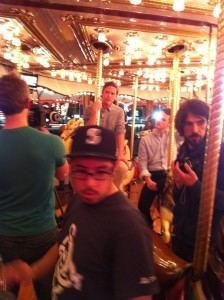
Just one more ride, okay? Urrpp, okay.
Then there’s Randall’s close encounter with the crab leg. I knew from the start that this would be part of the scene — this was a date, after all — and I knew it’s what everyone would remember about the scene. It just couldn’t go too far over-the-top or it would be stupid — and besides, this is a PG video. (Plus, Jeremy wanted to be able to show the thing to his parents!) Randall got it exactly right.
My other favorite scene is the one inside the car of the Seattle Great Wheel. Russel looks at Felicks, who’s looking away. Then Russel looks away, and Felicks looks over at him. Arrrrgg! They break my heart. But this is all part of the tension, their not quite connecting, all leading up to that great final kiss.
Then there’s the scene on the merry-go-round. It’s twenty seconds of film, but it meant ten different rides on the damn thing. Can you imagine what it feels like to ride a merry-go-round ten times in a row? I think we’re all still a little dizzy.
Are you going to do other music videos for your books?
I’d love to! I love the way this one turned out, and I ultimately had a blast making it. But it really depends on whether or not it sells enough extra copies to justify the time and the expense.
So if you liked the video, please share it with your friends — tweet it, post it, and “like” it!
And a special thinks to Tyler, Hans, Randall, and especially Brett Every and Jeremy Ward, who worked so hard and were so great to work with.
BUY BRETT’S SONG ON ITUNES
BUY MY DAMN BOOK
 Send to Kindle
Send to KindleJanuary 15, 2015
Is Amazon Evil (Revisited)?
 So in the latest episode of my podcast Media Carnivores (with Erik Hanberg), we return to the age-old question: Is Amazon Evil?
So in the latest episode of my podcast Media Carnivores (with Erik Hanberg), we return to the age-old question: Is Amazon Evil?
An interesting discussion!
 Send to Kindle
Send to KindleJanuary 14, 2015
Warning: Don’t Try This at Home! (Writing an Oscar-Nominated Screenplay, That Is)
So it’s that time of year when screenwriting blogs are circulating the “best” screenplays of the year — the ones that will be nominated for Best Screenplay Oscars, or ones that were almost nominated.
I always have very mixed feelings about this, about whether these screenplays are good example for aspiring writers to read.
It’s not that these aren’t good, or even great, screenplays — many truly are (although I’d argue some of them are overrated, that critics often fall for quirkiness and gimmickry, and that it’s terribly unfair how ignored and/or under-represented comedy and genre film projects always are).
That said, very few, if any, of these screenplays were written as spec scripts (without some kind of development deal in place). And if they had been, at least by unknown and unestablished writers, they never would have been picked up by producers.
 Trust me, every single producer in Hollywood would have turned down the screenplay to The Grand Budapest Hotel if it hadn’t been written by Wes Anderson. (I’m sure many would have turned it down even when it was written by him!)
Trust me, every single producer in Hollywood would have turned down the screenplay to The Grand Budapest Hotel if it hadn’t been written by Wes Anderson. (I’m sure many would have turned it down even when it was written by him!)
The same is probably true for almost all the critical favorites: American Sniper, Nightcrawler, Still Alice, Foxcatcher, A Most Violent Year, Whiplash, Into the Woods, Boyhood, and Birdman.
As spec screenplays, Gone Girl, Selma, The Imitation Game, and The Theory of Everything might have found takers as “labor of love” projects — but they all would have been very, very long shots for actual production.
Hollywood is a weird, weird animal: the very movies that insiders celebrate every year as “the best” they can do are the exact screenplays they seem least willing to actually want to read or make.
Does your screenplay have a voice-over? Forget it! Haven’t you heard that voice-overs are a plot-cheat?
Is your project in a genre that isn’t “hot” right now? Next!
Is it a period piece? Does it have an unsympathetic main character? Is there no role for a middle-aged man? Oh, and haven’t you heard that political movies don’t ever work?!
All these Oscar-contending movies broke “the rules” in big, big ways. Which is exactly what good screenwriters need to do. But it’s exactly what Hollywood, or at least the entire screenwriting establishment, is constantly telling you not to do.
Is that a contradiction? Maybe not. It takes a master screenwriter to break the rules well — and it goes without saying that most aspiring screenwriters are not masters.
A big part of being a successful screenwriter is slowly earning the right to do things differently.
But every year I am amused to see movies openly celebrated for doing things that I’ve been emphatically told all year long never to do.
 Send to Kindle
Send to KindleJanuary 13, 2015
What’s the Deal with all the A**hole Characters on Cable TV?
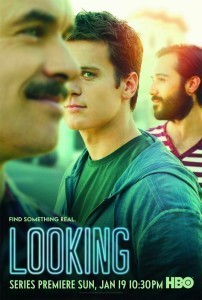 So I caught the premiere of season two of Looking last night — the HBO show about a group of gay friends in San Francisco. I didn’t think much of the first season: a bunch of extremely unpleasant characters in storylines that alternated between “way too slight” and “stupid soap opera.”
So I caught the premiere of season two of Looking last night — the HBO show about a group of gay friends in San Francisco. I didn’t think much of the first season: a bunch of extremely unpleasant characters in storylines that alternated between “way too slight” and “stupid soap opera.”
The problems with the first season seemed so obvious — and so widely shared by so many people I know — that I simply assumed the creators of Looking would listen and adjust their show accordingly. After all, it has an appealing cast of actors, and the show usually looks fantastic.
Based on the first episode of season two, I guess they decided to stick to their original vision and didn’t change a damn thing (which on some level, I admire).
So I guess I’ll be sitting this one out. But that makes me a little sad, because, even today, there is so little on TV about gay men.
The more interesting question is: what in the world is going on with all the “asshole” characters on TV today? I’m thinking of Looking, Girls, Togetherness, and virtually every animated show right now.
It’s definitely a meme. Suddenly, people can get enough of shallow, selfish, hateful, and/or self-absorbed characters, especially in their pseudo-comedies.
For the record, I have nothing against a good anti-hero. I absolutely think Breaking Bad will be remembered a hundred years from now, along with a handful of movies and books and plays, as some of the best art of the 21st century.
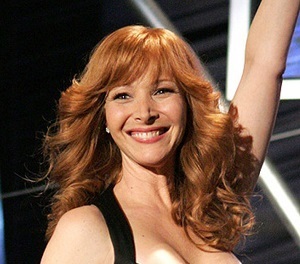 And I love Veep, and Silicon Valley, and Archer, and The Comeback, and The Outs (a web series) — all shows featuring casts of mostly raging assholes.
And I love Veep, and Silicon Valley, and Archer, and The Comeback, and The Outs (a web series) — all shows featuring casts of mostly raging assholes.
What is it about these shows I like? The characters are all mostly assholes, but the shows themselves have a very clear perspective on them: basically that their characters are assholes.
Assholes are the joke because assholes are a joke.
For the record, I also like TV characters who are, in general, flawed. The concept of “Mary Sue” came into existence for a very good reason.
But some of these shows, especially Girls and Looking, just leave me confused. I watch Jessa and I think, “Is she supposed to be psychotic? No one except an actual psychopath would act that way.” Or on Looking, I think, “Why would anyone stay friends with Agustin? He’s a horrible human being. Is the point that Patrick has absolutely no self-esteem?”
No, seriously. I don’t get it.
These shows don’t seem to me to be satires; in some sense, they seem like they’re trying to be “realistic.” Then there’s the fact that so many viewers clearly do identify with their characters, and the creators of these shows often talk like they’re more or less representing their actual lives and the people they know.
This can’t possibly be true, can it? I know almost no people this self-absorbed, this selfish, this bitchy, or this horrible to their friends. Is it a New York thing, or a San Francisco thing? (I doubt it; no one I know in those cities is like this.) And I think it’s downright offensive to somehow suggest these characters represent twentysomethings; these characters aren’t anything like the twentysomethings I know.
So what’s going on?
Honestly, part of me thinks these shows are just the television equivalent of “online click-bait”: in an extremely cluttered media environment, one way you “break out” is by having your characters do and say shocking and provocative things, even if they’re totally unrealistic. These are characters you haven’t seen on TV before (until lately), so the show seems hip and fresh and edgy and irreverent.
Mostly, these shows and characters bore me. And sometimes they kinda freak me out, because I think, “Is this really where society is headed? Where this kind of behavior is common or acceptable?”
Incidentally, I said I liked The Comeback. Part of the reason why I thought the latest season was so brilliant was because they were clearly satirizing the trend of HBO giving TV deals to the most miserable and pathetic of people, who were, in turn, using their shows to lionize miserable, pathetic characters just like themselves.
Once again, The Comeback is light years ahead of everything else on TV. They also doing it on HBO. Talk about biting the hand that feeds you!
Not coincidentally, I talk about “asshole” characters a lot in my latest book, The Thing I Didn’t Know I Didn’t Know, when Russel worries if he’s becoming an asshole character in his own storyline. How’s that for meta?
CHECK THE BOOK OUT HERE
 Send to Kindle
Send to KindleJanuary 6, 2015
Everything I Know About Movie-Making [Podcast Interviews]
So I recently appeared on the podcast of YourHollywoodPro.com, which is a website that matches aspiring filmmakers with Hollywood insiders. (If you’re looking for that kind of service, I recommend em!)
Here’s part 1:
And here’s part 2!
 Send to Kindle
Send to KindleJanuary 3, 2015
So Where’s This THE THING I DIDN’T KNOW I DIDN’T KNOW Music Video?
So in the back of my latest book (The Thing I Didn’t Know I Didn’t Know), I mention a music video I produced based on the book.
So where the heck is it?
Not released yet. It’s almost ready, but not quite. We’re finishing the final editing. Plus, I worried that if I released it right before Christmas, it would sort of get lost in the end-of-the-year rush.
But it looks pretty great, if I do say so myself. My friend musician Brett Every wrote a song based on the book, and my other friend Jeremy Ward directed, putting together a little video that is basically Russel and Felicks’ date night (before the end of the night). It’s pretty sweet, and the actors (Hans Iverson and Randall Brammer) did a fantastic job (except for yours truly, who plays the waiter; I never said I was an actor!).
More soon!
P.S. Here’s the cast inside one of the cars of the Seattle Great Wheel ferris wheel during the shoot. From left, that’s Hans (Russel), Randall (Felicks), Tylor Jones (our cinematographer), me, and Jeremy (the director).
 Send to Kindle
Send to KindleJanuary 2, 2015
E-Books Have Changed Everything (And Not Just in the Ways Most People Think!)
So it’s the start of the new year, and I can’t help but think about one big change that’s happened in my life — not just this last year, but over the last few years.
I started publishing my books as e-books. And it’s changed EVERYTHING in my career, and not just in the ways that most people talk about.
I sold my first book, Geography Club, in 2000 (to HarperCollins), and it was released in early 2003. And since the book was a young adult novel published in hardcover, it soon became clear to me who my book’s real audience was: librarians, teachers, bookstore owners/readers (who would then push it to teachers and librarians), industry reviewers (mostly women in their fifties), and those very few adult readers wealthy enough to take a chance on a hardcover novel by a debut author.
Plenty of teenagers were reading my books, true, but in the vast majority of cases, some adult was buying the book for them. Very few of them could afford to buy the book for themselves.
So, naturally, those book-buying adults were my primary audience.
Basically, I was writing for the “gatekeepers” — the people who decide what books teenagers should be reading. “Gatekeepers” is a buzzword in publishing, but it’s a very accurate buzzword. It describes something very real.
(My audience got a little wider when the book was released in paperback the following year, but not that much wider, since even the paperback was priced at $8.99 (in 2004 dollars). Mostly, I was still writing for librarians, teachers, reviewers, and bookstore owners/readers.)
Then around 2009, e-books hit. Around the same time, social media went really, really big.
Since then, my writing career has been COMPLETELY — and I mean COMPLETELY — transformed.
For one thing, my new books are immediately priced at $5.99 in the e-book edition — pretty darn affordable, even for teenagers and twentysomethings. A year later, when my book would have gone into paperback before, the price of the e-book now goes down to $3.99 — cheap. These e-editions are available everywhere too — all over the country and world, even in places that are hundreds of miles from a traditional bookstore.
For another thing, social media now allows my readers to directly spread the word about my books to their friends. It also allows them to directly interact with me, telling me specifically what they do (and don’t) like about my work.
Did I mention how this has completely transformed my writing career?
Basically, I am now writing directly for my readers — the people who most “get” me and my books. To sell books, I no longer have to first appeal to a select group of adults — often smart, well-meaning adults, but still adults who were pretty different from what I considered my most passionate readers.
I now write my books for my passionate readers, and then they buy them. What a concept, huh?
I know this brave new world of direct access to readers scares a lot of writers. They were used to the old system — a system that served them well. And change is always at least a little sad, because it means that some older institutions (like certain independent bookstores) have to die.
But as for me? I couldn’t be more excited by these changes. In every respect — creatively and financially — it’s been better for me as a writer.
What do you think? Is the rise of e-books a good thing or a bad thing for you as either a reader or a writer?
P.S. Just to be clear: my books are still available in print copies too!
 Send to Kindle
Send to KindleDecember 21, 2014
Thoughts on the Release of THE THING I DIDN’T KNOW I DIDN’T KNOW (My New Book)
Releasing a new book is always cause for anxiety. How will people react? What will the reviews be like? Will the damn thing sell any copies?
I’ve been doing this writer-thing long enough that I now know that it’s impossible to predict the answers to those questions beforehand.
Last week, I released my tenth novel, The Thing I Didn’t Know I Didn’t Know.
I’ll just say it: I think this is the best thing I’ve ever written. I’m extremely proud of it, and it’s also a pretty damn personal book, about things and characters that I care passionately about (in one way or another).
So maybe I was a tad more nervous than usual.
The book’s been out for a week now, and I can report that…I feel really good about things. Most of the early readers (who are obviously my most devoted fans) seem to really like it. More than one has said exactly what I was hoping to hear: namely, that it’s the best thing I’ve ever written.
(It’s always nice to get compliments from readers, but it’s slightly less nice to get a compliment on something you wrote fifteen years ago, versus something you wrote last year.)
On one hand, I could say, “Well, these are my fans. They’re the people most predisposed to liking the book.”
Which is absolutely true. But guess what? Because these are my fans, it’s their opinions that I care the most about (by far). They’re my loyal readers, the folks who have repeatedly entrusted me with their time and money. I really, really, really didn’t want to disappoint them.
Anyway, I’m tickled pink that, so far, they seem to be pleased with the new book.
Cheers!
Brent Hartinger
P.S. The book is selling pretty briskly too. Whew! I guess I’ll be able to pay my mortgage for another year.
P.P.S. If you have read and enjoyed the book, an Amazon and/or GoodReads review would be greatly appreciated. I know it seems like those things can’t possibly make a difference to a book’s success. Guess what? They really, really do.
ORDER THE BOOK
 Send to Kindle
Send to Kindle


